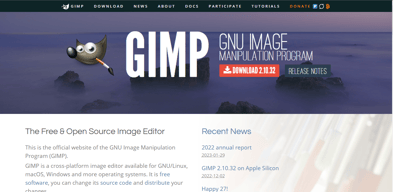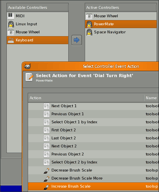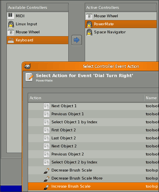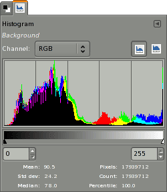

Unclaimed: Are are working at GIMP ?
GIMP Reviews & Product Details
The Gnu Image Manipulation Project, or GIMP, is a well-known alternative to Photoshop, given its affordability and similar features, including the ability to work with professional layers and fine-tune snap functionality. GIMP has a full photo editing interface available which you can customize to suit your needs. It features photo enhancement features that allow users to fix perspective distortion and explore filters. Digital retouching tools are also available, and users can save work in multiple file formats, including PNG, TIFF, and GIF. Because the GIMP environment is powered by a community of developers, you can expect a lot of regular updates and new features as well.
| Company | The GIMP Development Team |
|---|---|
| Year founded | 1995 |
| Company size | Myself Only employees |
| Headquarters | The GIMP project is developed by volunteers and does not have a physical headquarters. |
| Social Media |
|

| Capabilities |
|
|---|---|
| Segment |
|
| Deployment | Cloud / SaaS / Web-Based, Desktop Linux, Desktop Mac, Desktop Windows |
| Training | Documentation |
| Languages | English |
GIMP Pros and Cons
- Regular updates: Because the GIMP environment is powered by a community of developers, you can expect a lot of regular updates and new features.
- Tons of flexibility: Aside from offering a range of file formats, GIMP also supports a host of platforms, including GNU, Linux, Microsoft, Mac, and more.
- Community: Community support is excellent, with plenty of brushes, texture packs, and extra features to download online.
- Free open-source software
- Excellent digital retouching and touch-up tools
- The adjustment layers are difficult to work with at times, and can be quite buggy
- The interface isn’t well-suited to mac users.
- Learning curve for beginners




Compare GIMP with other popular tools in the same category.

This is a great open source program for those unable to afford the more costly programs such as Adobe Photoshop and their Master Suite counterparts. Although there is a learning curve, the ability to do everything that these other software (i.e. Adobe PhotoShop) can do is unbelievable.
In all honesty, there is very little to dislike about the software provided by GIMP.org. The fact it was created in an open source volunteer environment with very knowledgeable persons just mesmerizes the crap out of me. I could never achieve such feats.
GIMP has helped me create some wonderful images for friends, family, and even work. The wealth of knowledge on the internet in the form of blogs, forums and YouTube videos is a melting pot of lessons to be learned. The end results for a novice graphics person such as myself are wonderful.
GIMP is simply the best Image Manipulation Software available for free, and it is entirely open-source. It is pretty easy to use and is my go-to software for image editing.
There is nothing to dislike once you get friendly with the interface, but it might come as a very overwhelming tool for absolute beginners, given that there is too much to explore.
As the name suggests, GIMP is for image editing. It provides various tools within the software, which come in handy in situations like merging and stacking multiple images. If you are a photographer and need to blur/sharpen something, flatten the image, manipulate hue/saturation, and whatnot, you can do it all with this.
GIMP is a free photo editing software that does everything Photoshop does, or at least it does everything I've ever used Photoshop for. It gives me a wide range of options for editing and creating artwork, and saving it in various formats and ways.
It can be a little tricky to learn how to do certain things, especially if you are used to using Photoshop, but that just takes learning, and Googling will always provide answers to what others did.
Editing photos and artwork, as well as creating new images and artwork, and it's helping me do all the things I would need a Photoshop subscription to be doing. It's made things a lot easier for me.
The software is free and has amazing capabilities. I utilize many of the basic editing tools because I am still a novice when it comes to editing photos. However, I also use some of the plugins that have been developed. For example, I use a plugin that allows me to batch-edit many photos at one time. This comes in handy when you have to apply the same filters and sizing options to more than just a couple of photos. I was using it to edit multiple photos for a real estate agency that had 20-50 photos of each house. I would auto-color correct and resize them using the batching program. Then, I would manually fix the couple of images that we liked and wanted to touch up afterward.
The program can be a little confusing until you get your bearings. If I could make one recommendation, it would be to make the program a little more intuitive. Many times I have had to go watch a YouTube video to learn how to use the program.
I use GIMP when I need to make the same edits to several photos at one time. The batch editor plugin makes editing multiple photos quick and easy. I can run the plugin to edit a handful of photos, then go manually to edit the ones that need a little more attention. The other thing I use GIMP for, a lot, is to remove backgrounds from images. It is really easy to open GIMP and throw up a picture to remove a background. Once you remove the background, you can export the image in a PNG format and have a very good-quality image that has the background removed.
I like the wide range of extensions available for GIMP and the community of users that makes finding information a breeze. It is a powerful graphic design program that rivals paid options.
There is a sharp learning curve for this program. Some of the menu locations do not seem to be intuitive, so it would be nice if one could reorganize where items are in different menus.
I use gimp to design graphics for presentations and use them on social media. It has saved a lot of time in creating graphics for my church. It has templates that meet all my needs in those area.
It's easy to transition from Photoshop to Gimp. Gimp is also a powerful and versatile tool that produces professional looking results.
Since it's open source it's not always as easy to find support for specific issues.
Gimp is open source so I didn't have to ask my company for access to an expensive software package to meet my needs. I am able to produce professional looking products for a newsletter and pamphlets that I design.
It's abialt yto work with layers and alpha channels.
Floating layer selections and how menues seem to flip sides of the screen and disappear.
I use gimpt o adjust photo booth templates in the field. I have GImp installed on my laptops. When there's an issue so be solved with a template.....Gimp saves me everytime.
Powerful and free. Supports most common file types.
Not super intuitive but worth it to support the open source community.
I don't need image manipulation on a regular basis so paying a high price for the most popular software doesn't make sense. GIMP lets me make pretty technical alterations for free.
I like that it makes it easy and free to edit photos using features usually found on paid platforms
There is definitely a learning curve at times and i've had to look on youtube to find solutions on how to do specific tasks that are unclear in the software itself.
I have solved the need for advanced photo editing without paying for a software like photoshop. This has benefitted myself and others greatly as we've been able to save money without skimping on necessary tools.
All of the tools are available, which are there in photoshop and easy to use. The best thing is it is open source.
Locatability of tools is sometimes very difficult; else, all things are okay with GIMP
Creating designs and editing pictures for my client's websites/projects






